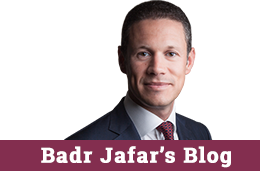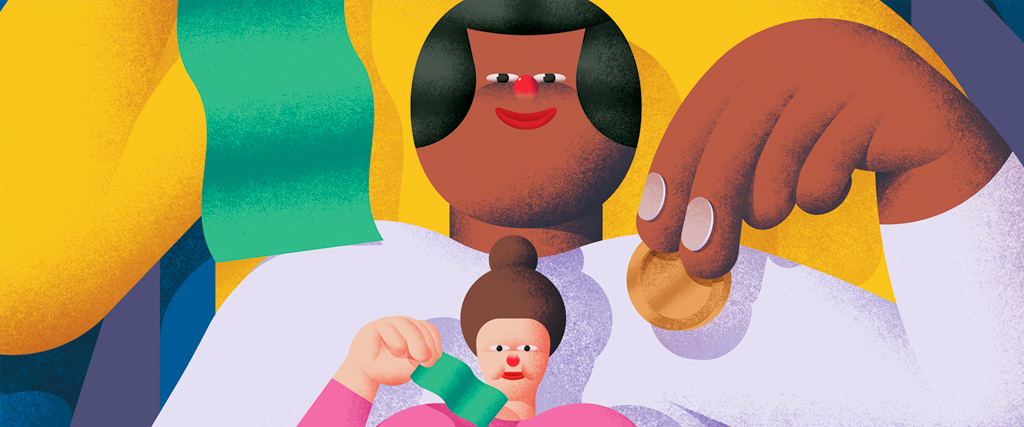Growth potential
This year, Christmas – traditionally a festive season for charitable giving – could be a time of discomfort and joylessness for those grappling with political uncertainties and rocketing prices. Many would be justified in thinking that a small charitable donation would just be a drop in the ocean, having little, if any impact. So, how uplifting to discover one Emirati man’s determined mission to put every charitable gesture from anywhere in the world, however tiny, to effective, strategic use.
Badr Jafar, CEO of Crescent Enterprises, a diversified business headquartered in Sharjah, UAE, was raised to be very aware of his community and the role that he should play within it. ‘It’s not just about what you can do to help provide stability and prosperity,’ he says, ‘but about what your community means to the rest of the world. I saw the dire need to reframe and connect my region to the wider world on a cultural and human level.’
One of Badr’s early attempts to redefine his region was a smash global hit single, Bokra. Aged 18, Badr met producer Quincy Jones and they set up a non-profit company to garner local talent and put them on a global stage. It was Badr’s idea to produce and release a charity anthem along the lines of the 1985 supergroup hit We are the World.
‘In the nervousness, instability and dysfunction that followed the Arab spring, we wanted to imbue some hope in the future,’ explains Badr, ‘so we pulled in musicians from every Arab country to perform Bokra, an anthem based on the 1984 song Tomorrow by Tevin Campbell. Bokra shot to the top of the charts, where it stayed for 16 weeks, raising around $8m, which helped create arts programmes for impoverished communities.’
Bokra earned Badr a Kennedy Center Gold Medal for his cultural diplomacy in building closer ties between nations and regions. Inspired by its success, his philanthropic efforts intensified.
‘Many across the region have a traditional view of almsgiving,’ he explains. ‘It is rooted in people’s societal interpretation of the scriptures, cash based and localised, with limited potential
to scale. In 2017, I was appointed to the UN Secretary General’s High-Level Panel on Humanitarian Financing, and faith-based giving came up during a discussion. One of the five pillars of Islam is giving to the poor, and annually the Muslim world donates compulsory (Zakat) and voluntary (Sadaqah) funds. The vast majority of donors are not HNWIs, giving on average $100, but when you add up those donations across approximately two billion people, they amount to between $400bn to $1tn every year. That’s huge.’
In 2020, Badr founded HasanaH, regulated by the UK Charities Commission, to maximise the impact of Islamic almsgiving. HasanaH is designed to be a community-driven digital platform to empower Muslim donors, and donors of all faiths, to give with improved transparency and effectiveness. With more than two years of research and partnership development, the platform now has over 5,600 campaigns from across 158 countries on board.
Badr also established the Centre for Strategic Philanthropy at Cambridge University, dedicated to enhancing the impact of strategic philanthropy both within and from the world’s fastest growing economies. Following this, he founded a Strategic Philanthropy Initiative at NYU Abu Dhabi to study and promote high-impact philanthropy in the Gulf region. In line with his vision to create a network of centres focused on strategic philanthropy in emerging markets, Badr is in discussions with universities in sub-Saharan Africa and developing Asia, to establish similar centres. ‘No centre is an island,’ insists Badr. ‘They will all work together.’
Badr also believes that harnessing media is crucial, as there is a dearth of stories and information around giving. For this purpose, he partnered with Alliance magazine, selecting groups of journalists in the Middle East, Africa and Southeast Asia, to focus and report on philanthropy in these regions and thus provide a springboard for impactful philanthropic actions. ‘Most studies on philanthropy are written through a western lens with no rigorous analysis outside of America and Europe,’ says Badr. ‘Yet, the most rapidly growing economies and middle classes are in emerging markets, where philanthropic giving is also steadily on the rise. It is important to make sure that this story is being told.
‘Philanthropic capital is the forgotten child of capitalism, often regarded with a degree of suspicion in many parts of the world,’ Badr concludes. ‘It wasn’t so much an epiphany as an obvious rethink to improve the infrastructure around giving so that every donor around the world, however small, can see the impact of their contribution and enhance its impact.’
When asked what fires his altruism, he says, ‘Philanthropy is the love of humanity, and that imbued me with a sense of deep responsibility’. At just 43, Badr has fast established himself as one of the world’s most effective philanthropic strategists. Most important of all, he is transforming our entire perception of what constitutes philanthropy and building the infrastructure to make even the smallest donation count.
As published in Brummell Magazine on 22 November 2022

 Tweets by @BadrJafar
Tweets by @BadrJafar









